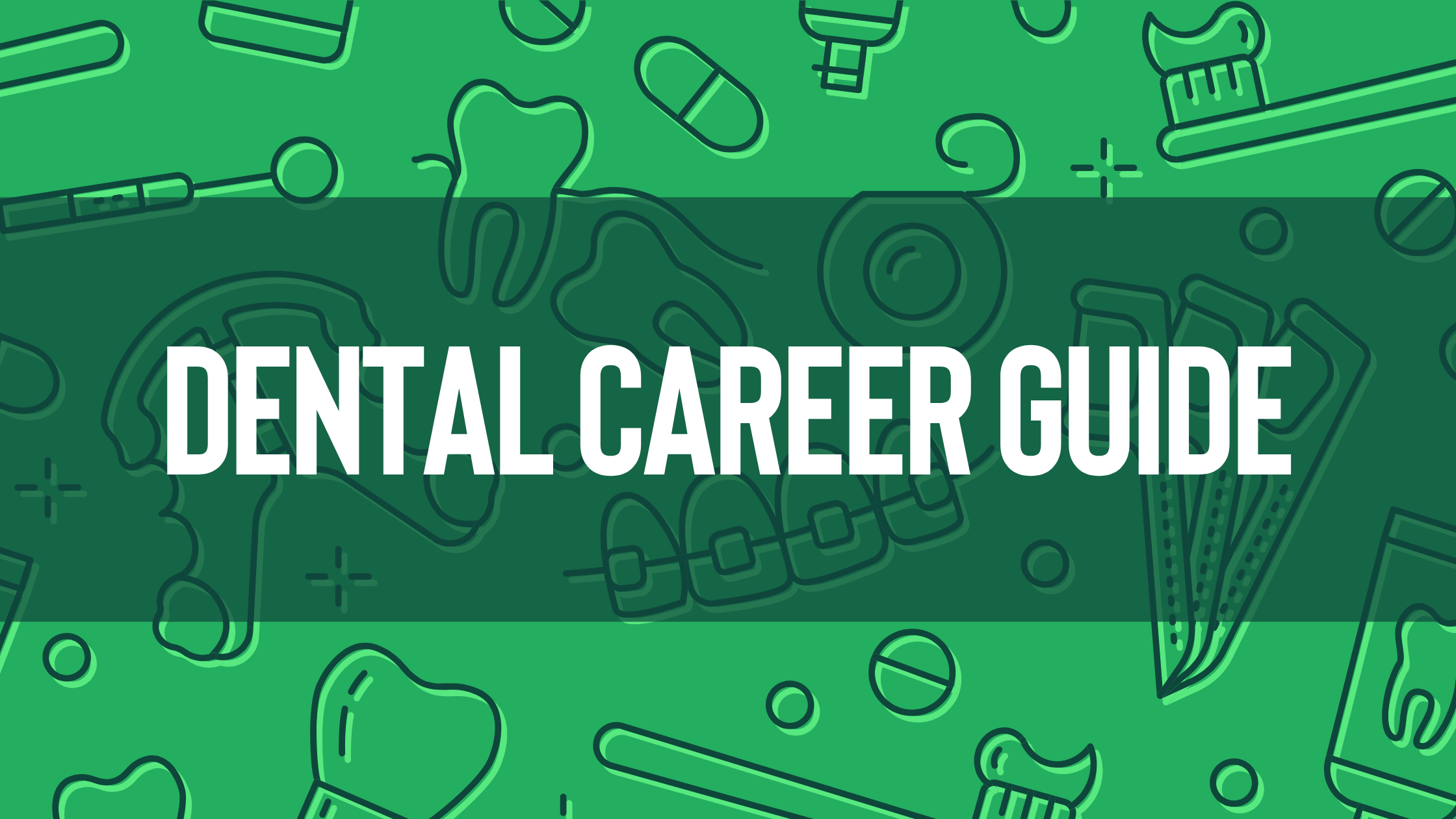

*This article was created in collaboration with the American Dental Association.*
If you have a passion for oral health and an obsession with your own pearly whites, a dental career path might be worth exploring, especially if you love helping people and working with your hands.
The dentist workforce is continually growing and is expected to increase through 2040, according to The U.S. Dental Workforce Report from the American Dental Association (ADA). As we near the end of a baby boomer retirement surge in the field, opportunities are opening up for newer dentists. Meanwhile, hygienists and dental assistants are already in high demand.
In a world where the media is constantly telling us that AI will take our jobs, the dental field (like many healthcare careers) is emerging as a more stable and safe job choice. It’s hard to automate hands-on and highly specialized job skills like the ones we see in dentistry. Plus, teeth are delicate, and I don’t know about you, but I feel more comfortable with a trained person caring for my mouth.
Dental professionals also have high job-satisfaction rates (80%) with six-figure salaries to match. According to our Salary Database, the highest publicly-shared salaries recorded were $1.5M for oral surgeons, $650,000 for pediatric dentists, and $500,000 for general dentists. The highest non-dentist role came in at $150,000 for dental hygienists. Pretty sweet deal, right? You’ll get to work on smiles while funding your own.
In this dental career guide, you’ll learn how to plan and prepare for your new career, including what your options are, how to choose a school or program, and where to find jobs. You’ll also learn about the wealth of resources for dental professionals offered by the ADA, as well as salary data from our database, interviews, and other public data sources like the U.S. Bureau of Labor Statistics (BLS).
What Types of Dental Career Paths Exist (& What Do They Make)?
There are many career paths within dentistry to explore, all of which have positive projected growth rates. Dentists and specialized dentists are projected to grow by 4% by 2034. Dental hygienists are projected to grow by 7%, with dental assistants not far behind at 6%, according to the BLS.
You don’t have to become a dentist to make good money either. Dentists aren’t the only lucrative dental career path that exists. There are many other roles, both clinical and non-clinical, that can still pull in six-figures. For example, we interviewed a dental hygienist that makes $55 - $60 an hour and an operations manager for a dental lab and dental practice who makes between $85,000 - $100,000 a year!
Let’s break down all of the possible dental professions out there and get to know them a little better 👇
*The salary data below is sourced from the BLS for median salaries, and our Salary Database and Glassdoor for the salary ranges.*
Job Title | Duties | BLS Median Salary | STS + Glassdoor Salary Range | Required Education |
| Dentist (general) | Provides treatment and diagnosis for teeth and gums. | $179,210 | Part-time: $38,000 - $300,000
Full-time: $67,000 - $400,000
Contract: | DDS or DMD |
| Pediatric Dentist | Specialized dentists for infants and minors. | $225,770 | $50,000 (contract) - $650,000 (full-time) | DDS/DMD & 2-3 year pediatric residency |
| Prosthodontist | Works on crowns, dentures, and implants. | $239,200 | Full-time: $484,000 - $811,000 | DDS/DMD & 3 year prosthodontics residency |
| Orthodontist | Focuses on teeth and jaw alignment. | $239,200 | Full-time: $120,000 - $350,000 | DDS/DMD & 2-3 year orthodontics residency |
| Endodontist | Performs root canal therapy. | $225,770 | Full-time: $424,000 - $751,000 | DDS/DMD & 2-3 year endodontics residency |
| Periodontist | Treats gum disease & supports structures like the jaw bone. | $225,770 | Full-time: $252,000 - $471,000 | DDS/DMD & 3 year periodontics residency |
| Oral Surgeon | Performs oral surgeries, such as extractions & reconstructions. | $239,200 | Full-time: $400,000 - $1.5M | DDS/DMD & 4-6 year surgical residency |
| Dental Hygienist | Cleans teeth while checking for disease and cavities. | $94,260 | Part-time: $77,000 - $125,000
Full-time: $54,000 - $150,000 | Associate’s or Bachelor’s in dental hygiene |
| Dental Assistant | Assists dentists during procedures. | $47,300 | Part-time: $29,000 - $61,000
Full-time: $35,000 - $61,000 | Certificate/diploma from a CODA program & state-specific requirements |
| Lab Technician | Makes prosthetics like crowns and dentures. | $45,820 | Full-time: $67,000 - $104,000 | Associate’s degree or on-the-job training |
| Dental Office Manager | Manage admin and business operations of a dental practice. | $66,000 | Full-time: $67,000 - $92,000 | Bachelor’s degree preferred with some dental office admin experience |
Dental salaries are some of the highest-paying healthcare salaries and may differ depending on your location and work environment. Dental healthcare workers with the highest salaries typically reside in Washington, Vermont, Alaska, and Delaware, while states with the lowest are Mississippi, Puerto Rico, Nevada, and Wyoming, according to the BLS Occupational Employment and Wage Statistics (OEWS) Map (a great resource to look at earnings across the country for any profession).
We interviewed a dental assistant that makes $27 an hour in Virginia, which was better pay than what she got in Washington D.C.. Her next goal is to go back to school to explore dental hygiene.
?
Working in dentistry means dental professionals have many different environments to choose from when deciding where to work:
- Private practices: Small and mid-size practices owned by a dentist or dentists who oversee all parts of the practice.
- Group practices: Multi-location practices that generally outsources non-clinical duties (like HR, billing, etc.) to an outside or corporate entity. Generally, dentists here are employees and not owners.
- Academic dentistry: Dental schools, universities and programs.
- Public health dentistry: Federal, state, and local agencies, like the U.S. Public Health Service, Department of Veteran Affairs (VA), and Indian Health Service (IHS).
- Dental laboratory: A facility that works with dental practices without a lab on-site to make custom devices like crowns, bridges, dentures, and implants.
- Research: Research at universities, private industry, and federal facilities, like the National Institute for Dental and Craniofacial Research, and the National Institutes of Health.
- International healthcare: International agencies, like the World Health Organization (WHO) and the Scientific and Cultural Organization (UNESCO).
- Hospital dentistry: Hospital settings.
- Nonclinical: Working in dental or other industries but not practicing.
How to Choose a School or Program
For Dentists:
When choosing a dental school, look for schools that are accredited by the Commission on Dental Accreditation (CODA). There are more than 60 schools that have this accreditation and you can use the CODA website to search for predoctoral, allied, or advanced dental education programs. To apply, use the central American Association of Dental Schools Application Service. All dental schools also require applicants to take a Dental Admissions Test.
Doctor of Dental Surgery (DDS) and Doctor of Medicine in Dentistry (DMD) degrees typically take four years to complete, plus additional years for dental specialties like oral surgery. Dentists must also be licensed. Expect to take courses like anatomy, microbiology, and biochemistry, among many others. The last two years is when the real fun starts and you spend most of your time with clinicals and patient care.
Average tuition costs vary by program and career path, but can total up to $400,000 for all four years, according to the ADA. Luckily, there are financial aid options like dental scholarships, grants, fellowships, and assistantship options if you want to try and avoid student loans.
The American Student Dental Association, American Dental Education Association (ADEA), and National Dental Association Foundation are all websites that you can use to find available programs. The ADA also offers financial resources on their website.
For Dental Team Members:
Dental hygienists, assistants, and other dental team roles require less schooling, and can get started with an associate’s degree or other trade job programs. However, a bachelor’s degree might help you command better pay and flexibility, but equivalent experience is just as valuable.
Learn more about each of these and where to find CODA accredited programs:
There is no CODA-accredited program for dental office managers. Typically, dental office managers have a variety of educational backgrounds. Some dental office managers have bachelor’s or associate degrees or some other type of formal education. But there are a variety of other educational opportunities available outside of a college or university setting and many can also learn on the job.
The American Dental Hygienist Association (ADHA), American Dental Assistants Association (ADAA), Dental Assisting National Board (DANB), National Association of Dental Laboratories (NADL), and American Association of Dental Office Management (AADOM) can help you find more information on education requirements, any required state licensing, and open job opportunities.
Where to Find Dental Jobs
The ADA Career Center is the best place to start your job search. Because dentistry is such a specialized area, you should start your job search with dental-specific job boards. The ADA Career Center is the perfect example. You can browse jobs in the many areas of dentistry, search for employers, and get career advice.
Our Salary Transparent Job Board can be your next stop to find more jobs in dentistry. All job listings have the salary range listed with important points about the job in an easy-to-read format.
Other helpful job search tools are federal job boards like the VA and the classifieds in your state’s dental association.
Next Steps: Resources for Students & Professionals
Other ways to take the next step towards a career in dentistry is to seek out entry-level work at dental offices or shadow other dental workers while you’re finishing your schooling. Reach out to those already in the field building their careers and get their perspective about what they would or wouldn’t do differently.
Talk to them about their salary too and any salary negotiation tips they used when landing their first few dental jobs. Depending on the pay transparency laws in your state, this information may or may not already be available when looking through current job listings.
They may also have tips for how they paid for dental school and either joined or started a dental practice. Then apply that advice to your own situation.
The ADA has a wealth of resources for new students and current dental professionals on their Career Hub. Take full advantage of it for guidance and resources straight from dental experts that can help you start from ground zero and grow your career from there.
If you want to learn more about other careers, check out our other recent free career guides:
- Healthcare Career Guide
- How to Get Into a Trade
- How to Break Into Tech
- How to Start a Creative Career (or Pivot to One)
Until next time, stay awesome, stay strong, and keep advocating for yourself no matter what! I’m Daniella Flores, a former engineer who writes about tech, money, and careers, a current member of the CNET Money Expert Review Board, and career researcher that’s appeared in TIME, CNBC, and Investopedia (among many others). I’m extremely passionate about workers' rights and financial freedom, so it’s a pleasure to be able to bring you this type of content through the Salary Transparent Street blog (thank you for the opportunity, Hannah!) You can also follow me on Linkedin. Chat soon!
If this guide helps you land your dream job, let us know! Send us an email ➡️ hello@salarytransparentstreet.com
For more Salary Transparent Resources:
- Want to join the movement? Explore thousands of individually reported salaries nationwide across all industries in our Salary Database!
- Looking for a job? Start your job search on our salary transparent job board!
- Do you know if you're being underpaid? Take our free quiz to find out!
- Don’t know what you want to do? Take any of our free career quizzes!
- Need help determining your market rate? Download our free Market Research Guide to learn what you should be making.
- Need help negotiating your salary? Download our free Salary Negotiation Guide!
- Follow us on TikTok, Instagram, Facebook, YouTube and LinkedIn for daily pay transparency interviews and career news you can use!
- Subscribe to our weekly newsletter for news updates, professional deep dives, learning opportunities, and more!


